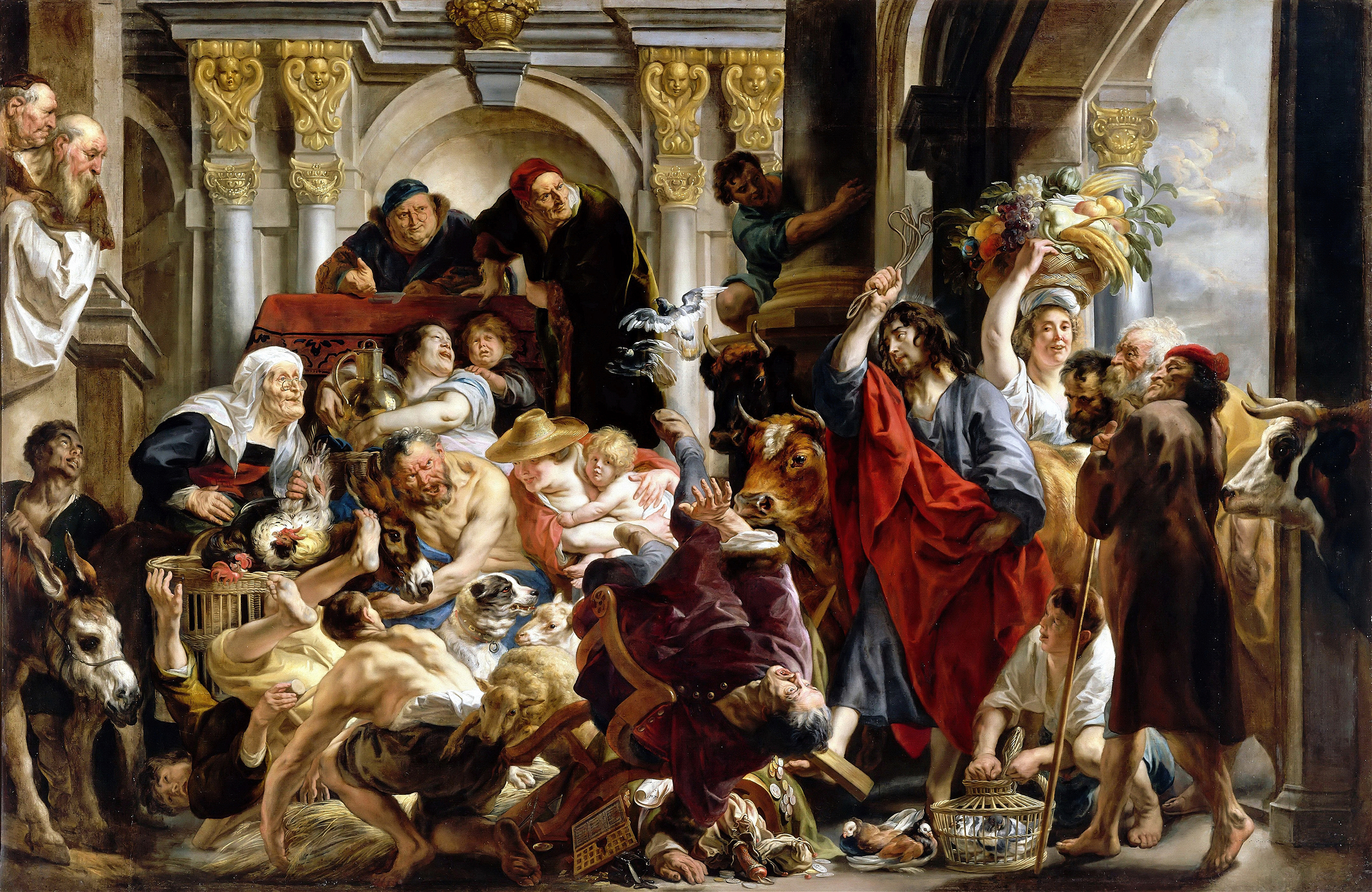
"Jesus Driving The Merchants From The Temple" (1645-50) by Jacob Jordaens (Artvee)
When you ask someone what their religion is, the chance that they will say "none" has increased dramatically in the past few decades. Religiosity used to be a defining characteristic of U.S. culture. Protestants were known for the word and avoiding statues; Catholics attended Sunday Mass and abstained from meat on Fridays; Jewish people were notable for their faithful observance of the Sabbath.
Today, Exodus recounts God's self-description: "I am the Lord who brought you out of Egypt." This tells us that Israel's God gets involved in human history by calling on people like Moses to carry out divine plans. Then we hear God's commandments, which were not really very extraordinary; most mirrored the ethics of civilizations of their time: No society condoned lying, stealing or abandoning the elderly.
But Israel's Sabbath was unique. Imitating their God, Israelites consecrated one of every seven days for worship, family celebrations and leisure. The Sabbath affirmed that people are more important than work, that strong relationships with God and others outvalue any accomplishment and that everyone needs time for re-creation, for recentering themselves in relation to everything else. Sabbath became an approach to life sacramentalizing the people's time and leisure. The Sabbath enhanced the people's relationship with God and also intensified their shared identity. The attitude of Sabbath honed Israel's appreciation of the sacredness that surrounded them and highlighted places and practices that sharpened their awareness of the presence of God and the meaning of their life.
While the God of Israel could appear anywhere, the temple functioned as a focal point for prayer and other expressions of the peoples' relationship with God. It was a holy place. The day Jesus entered the temple he observed not faith, but sacrilege. This place of worship, the religious center for all God's people, looked like a bazaar — one in which distinctions between male and female, clergy and laity, wealthy and poor were on display and reinforced.
Rather than being an inducement to prayer, sacrifice had become a business, supporting the money changers and merchants who made fortunes by selling supposed access to God. Operating as the opposite of what it was intended to be, the temple could impede people's experience of a merciful, loving God. In Jesus' eyes, the temple had become a blasphemy, the anti-reign of God.
After evicting the religious retailers, Jesus made the famous statement, "Destroy this temple and in three days, I will raise it up again." John explains that "this temple" referred to Jesus himself, not an architectural wonder. As in his conversation with a woman at a well, that phrase taught that God's presence cannot be captured in structures — be they buildings, tabernacles or even particular practices. We discover God's presence like Moses did. He experienced a mystery that called him to an impossible vocation, a vocation that came to fruition through the help of the Holy Spirit. Jesus claimed that he definitively replaced the temple and sacrifice. He sacramentalized the presence of God through his loving relationships and all that flowed from them.
When we say that God is love, we assert that God's presence is mediated in relationships. Institutions may facilitate our awareness of God's presence, but we encounter God in prayer and in the love among us that makes God's own love palpable in our world.
When we say that we are Christians, we claim with St. Paul that we believe that God's greatest self-revelation came to us in Christ whose cross revealed that the foolish vulnerability of divine love expresses the greatest power in creation. The power of divine love is neither controlling nor coercive. God's love attracts and woos us.
Advertisement
Jesus' vehemence in the temple sprang from the fact that people had distorted their faith and desecrated God's house. They offered a counterfeit relationship with God based on sacrifice over love. If the desecrators of the temple had been asked what their religion was, one honest answer would have been, "profit," and another would have been "power." The most cynical and honest might have said, "none."
Contemplating Jesus' fury in the temple calls us to take account of ourselves. What religion do we proclaim in our worship and our daily actions? Do we take advantage of holy times for re-creation that can permeate our week or have our Sabbaths slipped away, taking second (or third) place to work, profit, sports or any other activity that distracts us from taking the time to create ever-deeper relationships with God and neighbor?
This third week of Lent calls us to re-evaluate our religious identity. If we ask not what we call our denomination, but what our behavior reveals about our real beliefs, what's the honest answer? How do we want to answer?
